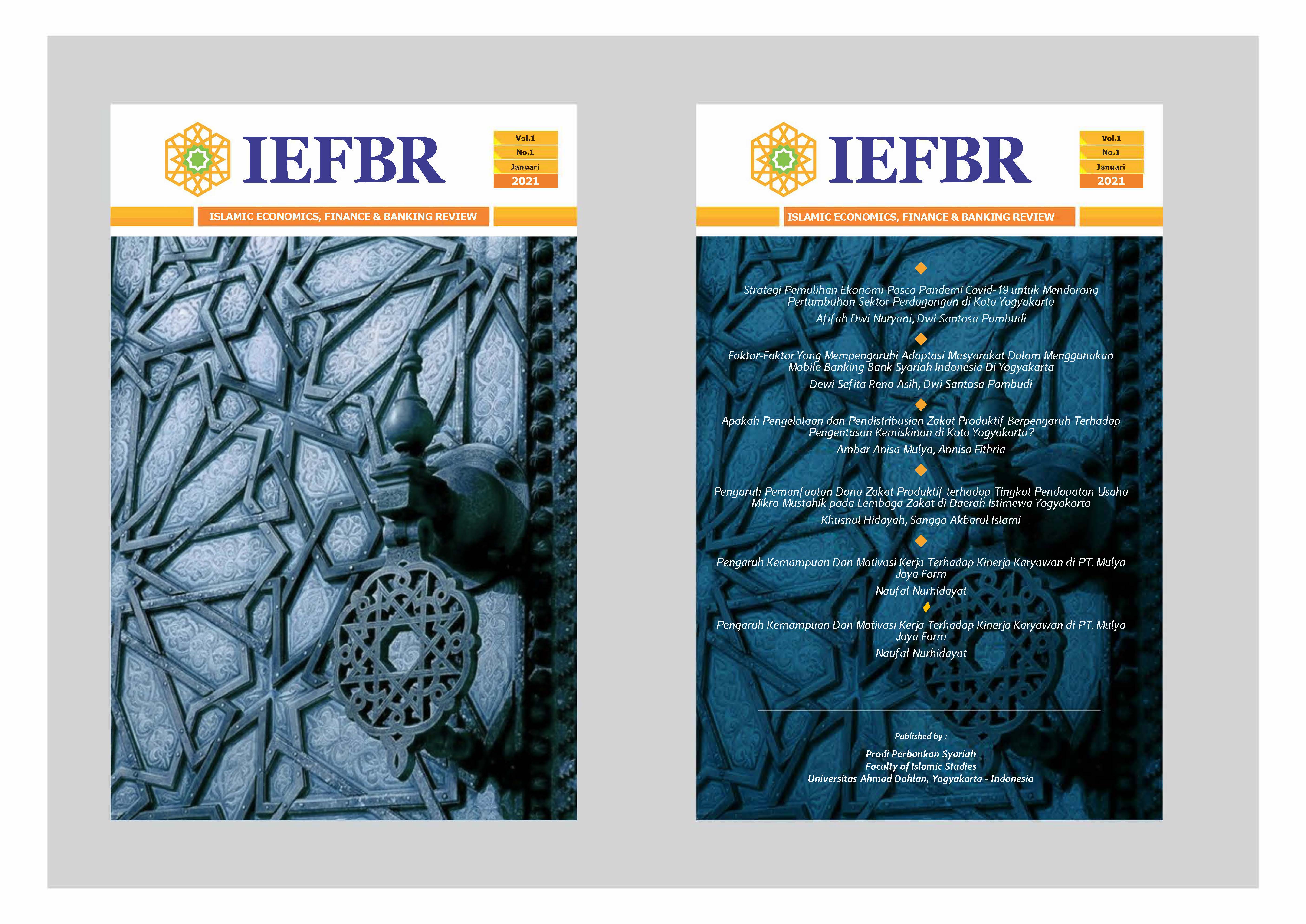Analisis Faktor Internal Dan Faktor Eksternal Yang Mempengaruhi Preferensi Pedagang Pasar Godean Terhadap Para Rentenir
DOI:
https://doi.org/10.12928/iefbr.v3i1.11237Keywords:
Internal Factor; External Factor; Preference; Loan SharkAbstract
The present study aims to determine the internal and external factors affecting the loan shark preference of the Godean Market merchants in carrying out business financing and to analyze the most dominant factor affecting the loan shark preference of the Godean Market merchants in carrying out business financing. The research type was qualitative descriptive phenomenological. The present study used primary and secondary data. The present study used a non-probability sampling technique. The informants in the present study were the management and merchants at GodeanMarket. Based on the research result, the number of traders is greater than that of loan sharks who control Godean Market, loan sharks from institutions, and individuals from Yogyakarta and Sumatra. It is concluded that the internal factors affecting the loan shark preference of Godean market merchants are declining income, a convenient loan system, and a manageable installment system based on their ability to carry out their obligations. Meanwhile, the external factors affecting the loan shark preference of Godean market merchants are market relocation, minimum risk, and lack of access to formal financial institutions. The dominant factors are declining income, convenient loan or financing systems, and installment systems.
References
A, Q. (2021). Penelitian Kualitatif: Pengertian, Ciri-Ciri, Tujuan, Jenis, dan Prosedurnya. Gramedia Blog. https://www.gramedia.com/literasi/penelitian-kualitatif/
Aisyah, S. (2014). Preferensi Usaha Kecil Dan Mikro Di Pasar Baru Cikarang Dalam Memilih Akses Pembiayaan. Al-Iqtishad: Journal of Islamic Economics, 6(1), 1–9. https ://doi.org/10.15408/ijies. v6i1.1365
Ayogi, V. D., & Kurnia, T. (2015). Optimalisasi Peran Bmt Dalam Upaya Penghapusan Praktik Rentenir. Jurnal Syarikah: Jurnal Ekonomi Islam, 1(1), 1–16. https://doi.org /10.30997/jsei. v1i1.254
Basri, E. (2022). Fenomena Rentenir Vs Bank dalam Kacamata Ekonomi Artikel ini telah tayang di Katasulsel.com dengan judul: Fenomena Rentenir Vs Bank dalam Kacamata Ekonomi. Katasulsel.Com. https://katasulsel.com/2022/10/fenomena-rentenir-vs-bank-dalam-kacamata-ekonomi/
Fathurrahman, A., & Amirah, A. (2020). Determinan Ketergantungan Pedagang Muslim Pasar Tradisional terhadap Kredit Rentenir. Jesya (Jurnal Ekonomi & Ekonomi Syariah), 4(1), 303–310. https://doi.org/10.36778/jesya.v4i1.343
Leonard, B. (2020). 8 Jenis Lembaga Keuangan dan Definisinya. Rumah.Com. https://www.rumah.com/panduan-properti/jenis-lembaga-keuangan-dan-definisinya-27159
M. Yahya. (2021). Rentenir: Alternatif Kredit Bagi Pedagang Muslim di Kota Langsa Pada Masa Pandemi COVID-19. Jurnal Samudra Ekonomika, 5(2), 134–142. https ://doi.org/10.33059/jse. v5i2.4271
Navis, M. S. (2015). Preferensi Pedagang Pasar Tradisional Terhadap Sumber Permodalan (Studi Pada Pedagang Pasar Merjosari, Kecamatan Lowokwaru – Kota Malang). Jurnal Ilmiah Mahasiswa Fakultas Ekonomi Dan Bisnis Universitas Brawijaya, 3(1), 1–15.
Panajitan, F. E. (2018). Praktis Pelepas uang /rentenir Di Nagari Lubuk Basung Kabupaten Agam Sumatera Barat Jurnal Buana – Vol-2 No-1 tahun 2018. Jurnal : Buana, 2(1), 398–409.
Pasar Godean Yogyakarta. (n.d.). Gudegnet.
Ramadhani, N. (2020). Lembaga Keuangan : Pengertian, Manfaat, Fungsi, Dan Jenis. Akseleran. https://www.akseleran.co.id/blog/lembaga-keuangan/
Sugiyono, P. (2016). Metode Penelitian Manajemen (Pendekatan Kuantitatif, Kualitatif, Kombinasi (Mixed Methods), Penelitian Tindakan (Action Research, dan Penelitian Evaluasi). Bandung: Alfabeta CV.
Undang-Undang Republik Indonesia. (2014). Undang-Undang Republik Indonesia No. 7 Tahun 2014 Tentang Perdagangan. LN.2014/No. 45, TLN No. 5512, LL SETNEG: 56 HLM, 1–56. https://peraturan.bpk.go.id/Home/Details/38584/uu-no-7-tahun-2014
William W, A. (2022). Mengenal Fungsi Lembaga Keuangan, Jenis, dan Manfaatnya. Mekari Jurnal. https://www.jurnal.id/id/blog/lembaga-keuangan-2/
Yekti, Ananti. Sulastyah, A. (2020). Eeksistensi Lembaga Keuangan Mikro Dalam pengembangan pertanian. 5(2), 116.
Downloads
Published
Issue
Section
License
Copyright (c) 2024 Rika May Linda Anggraini, Akhmad Arif Rifan

This work is licensed under a Creative Commons Attribution-ShareAlike 4.0 International License.
Authors who publish with Journal Islamic Economics, Finance, and Banking Review (IEFBR) agree to the following terms:
- All articles published are Open Access which means they will be immediately and permanently free for everyone to read and download. We use the CC-BY-SA license options under the Creative Commons Attribution License (CC BY-SA 4.0). Creative Commons Attribution License (CC BY-SA 4.0). CC-BY-SA assures that all works will be available under CC-BY-SA always and no risk of commercial actions against the will of the copyright holder.  Â
- Anyone can use, copy and disseminate the material in any medium or format; as well as re-use, re-mix, transform, and build upon the material for any purpose, even commercially. However, they must acknowledge the authors by giving appropriate credits (cite to the article or content), provide a link to the license, and indicate if changes were made and use under the same license as the original.
- Authors retain copyright and grant license exclusive rights in their article to Universitas Ahmad Dahlan as the publisher of the Journal Islamic Economics, Finance, and Banking Review (IEFBR).
- Authors have the right to retain patent, trademark, and other intellectual property rights (including research data).Â
- Authors have the right to proper attribution and credit for the published work.
Copyright Transfer Agreement
- The Authors submitting the manuscripts do so on the understanding that if they are accepted for publications, the copyright of the articles shall be assigned to Universitas Ahmad Dahlan as the publisher of the Journal Islamic Economics, Finance, and Banking Review (IEFBR).
- Universitas Ahmad Dahlan as the publisher of the Journal Islamic Economics, Finance, and Banking Review (IEFBR), the Editors, and the Editorial Board Members of the Journal Islamic Economics, Finance, and Banking Review (IEFBR) make every effort to ensure that no wrong or misleading data, opinions, or statements are published in the journal. In any way, the contents of the articles and circulars published in the Journal Islamic Economics, Finance, and Banking Review (IEFBR) are the sole and exclusive responsibility of their respective authors and advertisers.
- The publisher may revoke the publication for violating the ethical code of conduct.


